





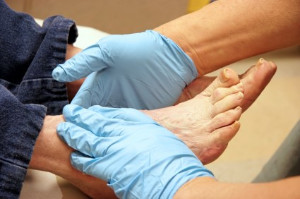 It is estimated that approximately one third of people with diabetes will develop a diabetic foot ulcer. History has shown that diabetics are more likely to have problems and complications related to their feet than others. This is largely to due the fact that the disease raises blood sugar levels, which decreases both sensation and circulation. According to experts, people with diabetes are far less likely to feel pain in their feet. Furthermore, it has been found that 40% of diabetics who develop ulcers will experience some sort of recurrence within a year.
It is estimated that approximately one third of people with diabetes will develop a diabetic foot ulcer. History has shown that diabetics are more likely to have problems and complications related to their feet than others. This is largely to due the fact that the disease raises blood sugar levels, which decreases both sensation and circulation. According to experts, people with diabetes are far less likely to feel pain in their feet. Furthermore, it has been found that 40% of diabetics who develop ulcers will experience some sort of recurrence within a year.
Diabetic foot care is important in preventing foot ailments such as ulcers. If you are suffering from diabetes or have any other concerns about your feet, contact one of our podiatrists from Active Foot and Ankle Care, LLC. Our doctors can provide the care you need to keep you pain-free and on your feet.
Diabetic Foot Care
Diabetes affects millions of people every year. The condition can damage blood vessels in many parts of the body, especially the feet. Because of this, taking care of your feet is essential if you have diabetes, and having a podiatrist help monitor your foot health is highly recommended.
The Importance of Caring for Your Feet
Patients with diabetes should have their doctor monitor their blood levels, as blood sugar levels play such a huge role in diabetic care. Monitoring these levels on a regular basis is highly advised.
It is always best to inform your healthcare professional of any concerns you may have regarding your feet, especially for diabetic patients. Early treatment and routine foot examinations are keys to maintaining proper health, especially because severe complications can arise if proper treatment is not applied.
If you have any questions please feel free to contact our offices located in Fair Lawn, Riverdale, and Englewood, NJ . We offer the newest diagnostic and treatment technologies for all your foot and ankle needs.
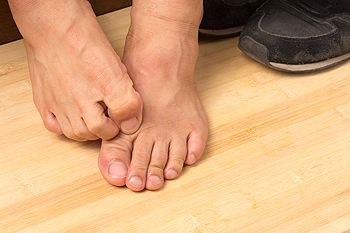 Suzie, an average woman, had felt a numbing and burning sensation in her foot for several years. She had been consistently told by doctors that she was experiencing neuropathy and that there was little that could be done. Only after her doctor referred her to a podiatrist did she become aware that what she was actually experiencing was tarsal tunnel syndrome, an often misdiagnosed condition that causes a variety of nerve problems such as numbness or burning sensations in the foot. Regular doctors often have trouble identifying tarsal tunnel syndrome and only through special nerve tests conducted by podiatrists can proper diagnosis and treatment be prescribed. If you are experiencing numbness and pain in your foot, be sure to seek out a podiatrist.
Suzie, an average woman, had felt a numbing and burning sensation in her foot for several years. She had been consistently told by doctors that she was experiencing neuropathy and that there was little that could be done. Only after her doctor referred her to a podiatrist did she become aware that what she was actually experiencing was tarsal tunnel syndrome, an often misdiagnosed condition that causes a variety of nerve problems such as numbness or burning sensations in the foot. Regular doctors often have trouble identifying tarsal tunnel syndrome and only through special nerve tests conducted by podiatrists can proper diagnosis and treatment be prescribed. If you are experiencing numbness and pain in your foot, be sure to seek out a podiatrist.
Tarsal tunnel syndrome can be very uncomfortable to live with. If you are experiencing tarsal tunnel syndrome, contact one of our podiatrists of Active Foot and Ankle Care, LLC. Our doctors can provide the care you need to keep you pain-free and on your feet.
Tarsal Tunnel Syndrome
Tarsal tunnel syndrome, which can also be called tibial nerve dysfunction, is an uncommon condition of misfiring peripheral nerves in the foot. The tibial nerve is the peripheral nerve in the leg responsible for sensation and movement of the foot and calf muscles. In tarsal tunnel syndrome, the tibial nerve is damaged, causing problems with movement and feeling in the foot of the affected leg.
Common Cause of Tarsal Tunnel Syndrome
The Effects of Tarsal Tunnel Syndrome
A physical exam of the leg can help identify the presence of tarsal tunnel syndrome. Medical tests, such as a nerve biopsy, are also used to diagnose the condition. Patients may receive physical therapy and prescriptive medication. In extreme cases, some may require surgery.
If you have any questions please feel free to contact our offices located in Fair Lawn, Riverdale, and Englewood, NJ . We offer the newest diagnostic and treatment technologies for all your foot and ankle needs.
Read more about Tarsal Tunnel Syndrome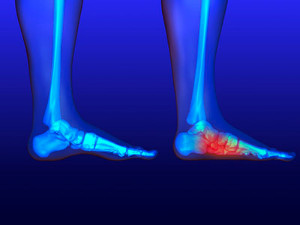 Researchers at Kansas University of Technology were able to develop a device that can measure pressure on human feet. The feet are responsible for carrying most of the body’s weight when a person walks, and as a result, they tend to endure the most mechanical pressure. Studying the pressure changes in one's feet can lead to the diagnosis of more serious problems such as diabetes, flat feet, and toe deformities. Flat foot is a treatable condition, and although the most common ways to treat it are by using special shoes and monitoring gait; analyzing the pressure in the feet can be beneficial as well.
Researchers at Kansas University of Technology were able to develop a device that can measure pressure on human feet. The feet are responsible for carrying most of the body’s weight when a person walks, and as a result, they tend to endure the most mechanical pressure. Studying the pressure changes in one's feet can lead to the diagnosis of more serious problems such as diabetes, flat feet, and toe deformities. Flat foot is a treatable condition, and although the most common ways to treat it are by using special shoes and monitoring gait; analyzing the pressure in the feet can be beneficial as well.
Flatfoot is a condition many people suffer from. If you have flat feet, contact one of our podiatrists from Active Foot and Ankle Care, LLC. Our doctors will treat your foot and ankle needs.
What Are Flat Feet?
Flatfoot is a condition in which the arch of the foot is depressed and the sole of the foot is almost completely in contact with the ground. About 20-30% of the population generally has flat feet because their arches never formed during growth.
Conditions & Problems:
Having flat feet makes it difficult to run or walk because of the stress placed on the ankles.
Alignment – The general alignment of your legs can be disrupted, because the ankles move inward which can cause major discomfort.
Knees – If you have complications with your knees, flat feet can be a contributor to arthritis in that area.
Symptoms
Treatment
If you are experiencing pain and stress on the foot you may weaken the posterior tibial tendon, which runs around the inside of the ankle.
If you have any questions please feel free to contact our offices located in Fair Lawn, Riverdale, and Englewood, NJ . We offer the newest diagnostic and treatment technologies for all your foot and ankle needs.
Read more about Flat Feet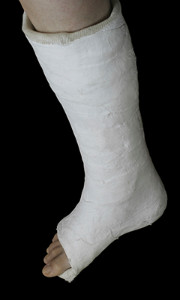 World Surf League Champion Kelly Slater recently suffered a broken foot while free surfing. After suffering the injury, Slater went toward the shore where he was able to receive treatment from medical staff. He posted a picture of his x-ray on Instagram with the caption, “Kinda' like smashing my foot with a big hammer as hard as I can.” He later announced that he would need a recovery period of six weeks after the surgery. This injury is devastating news for Slater who had been doing well in the competition.
World Surf League Champion Kelly Slater recently suffered a broken foot while free surfing. After suffering the injury, Slater went toward the shore where he was able to receive treatment from medical staff. He posted a picture of his x-ray on Instagram with the caption, “Kinda' like smashing my foot with a big hammer as hard as I can.” He later announced that he would need a recovery period of six weeks after the surgery. This injury is devastating news for Slater who had been doing well in the competition.
A broken foot requires immediate medical attention and treatment. If you need your feet checked, contact one of our podiatrists from Active Foot and Ankle Care, LLC. Our doctors can provide the care you need to keep you pain-free and on your feet.
Broken Foot Causes, Symptoms, and Treatment
A broken foot is caused by one of the bones in the foot typically breaking when bended, crushed, or stretched beyond its natural capabilities. Usually the location of the fracture indicates how the break occurred, whether it was through an object, fall, or any other type of injury.
Common Symptoms of Broken Feet:
Those that suspect they have a broken foot shoot seek urgent medical attention where a medical professional could diagnose the severity.
Treatment for broken bones varies depending on the cause, severity and location. Some will require the use of splints, casts or crutches while others could even involve surgery to repair the broken bones. Personal care includes the use of ice and keeping the foot stabilized and elevated.
If you have any questions please feel free to contact our offices located in Fair Lawn, Riverdale, and Englewood, NJ . We offer the newest diagnostic and treatment technologies for all your foot and ankle needs.
Read more about Causes, Symptoms, and Treatment for a Broken Foot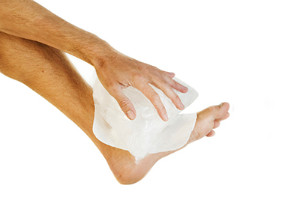 Ankles are an important part of the human body's structure, since they provide the flexibility needed to walk. An ankle sprain occurs when there is a tear in the ligament. These tears can either be mild and result in a mild sprain, or they can be severe and cause a more serious sprain. Ankle sprains can happen to anyone regardless of age, and they can occur while performing any everyday activity. If you are suffering from a mild sprain, it is advised that you follow the RICE method, which stands for Rest, Ice, Elevation, and Compression. Anti-inflammatory medications may also be used to treat minor cases of ankle sprains.
Ankles are an important part of the human body's structure, since they provide the flexibility needed to walk. An ankle sprain occurs when there is a tear in the ligament. These tears can either be mild and result in a mild sprain, or they can be severe and cause a more serious sprain. Ankle sprains can happen to anyone regardless of age, and they can occur while performing any everyday activity. If you are suffering from a mild sprain, it is advised that you follow the RICE method, which stands for Rest, Ice, Elevation, and Compression. Anti-inflammatory medications may also be used to treat minor cases of ankle sprains.
Ankle sprains are common but need immediate attention. If you need your feet checked, contact one of our podiatrists from Active Foot and Ankle Care, LLC. Our doctors can provide the care you need to keep you pain-free and on your feet.
How Does an Ankle Sprain Occur?
Ankle sprains take place when the ligaments in your ankle are torn or stretched beyond their limits. There are multiple ways that the ankle can become injured, including twisting or rolling over onto your ankle, putting undue stress on it, or causing trauma to the ankle itself.
What Are the Symptoms?
Preventing a Sprain
Treatment of a Sprain
Treatment of a sprain depends on the severity. Many times, people are told to rest and remain off their feet completely, while others are given an air cast. If the sprain is very severe, surgery may be required.
If you have suffered an ankle sprain previously, you may want to consider additional support such as a brace and regular exercises to strengthen the ankle.
If you have any questions please feel free to contact our offices located in Fair Lawn, Riverdale, and Englewood, NJ . We offer the newest diagnostic and treatment technologies for all your foot and ankle needs.
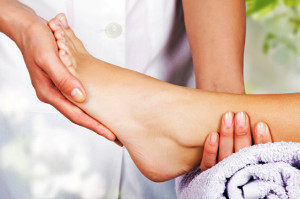 As you grow older, you may start to experience more problems with your feet. When dealing with your feet, it is crucial that you do not ignore any persistent pain you are feeling. You should perform daily foot inspections to ensure that there are no abnormalities. A helpful tip is to make sure you are wearing shoes that fit properly and are not worn out. When you go shoe shopping, you should go later in the day when the feet are at their largest. It is also important that you avoid wearing the same pair of shoes everyday. Lastly, avoid walking around barefoot, since doing so may make you more prone to infection and injury.
As you grow older, you may start to experience more problems with your feet. When dealing with your feet, it is crucial that you do not ignore any persistent pain you are feeling. You should perform daily foot inspections to ensure that there are no abnormalities. A helpful tip is to make sure you are wearing shoes that fit properly and are not worn out. When you go shoe shopping, you should go later in the day when the feet are at their largest. It is also important that you avoid wearing the same pair of shoes everyday. Lastly, avoid walking around barefoot, since doing so may make you more prone to infection and injury.
Everyday foot care is very important to prevent infection and other foot ailments. If you need your feet checked, contact one of our podiatrists from Active Foot and Ankle Care, LLC. Our doctors can provide the care you need to keep you pain-free and on your feet.
Everyday Foot Care
Often, people take care of their bodies, face and hair more so than they do for their feet. But the feet are a very important aspect of our bodies, and one that we should pay more attention to. Without our feet, we would not be able to perform most daily tasks.
It is best to check your feet regularly to make sure there are no new bruises or cuts that you may not have noticed before. For dry feet, moisturizer can easily be a remedy and can be applied as often as necessary to the affected areas. Wearing shoes that fit well can also help you maintain good foot health, as well as making it easier to walk and do daily activities without the stress or pain of ill-fitting shoes, high heels, or even flip flops. Wearing clean socks with closed shoes is important to ensure that sweat and bacteria do not accumulate within the shoe. Clean socks help to prevent Athlete’s foot, fungi problems, bad odors, and can absorb sweat.
If you have any questions please feel free to contact our offices located in Fair Lawn, Riverdale, and Englewood, NJ . We offer the newest diagnostic and treatment technologies for all your foot and ankle needs.
Read more about Every Day Foot Care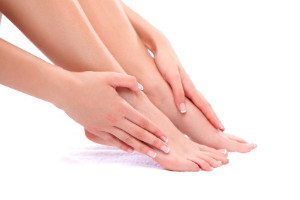 If you have swelling, pain, redness, or infection near your big toe; you may have an ingrown toenail. Ingrown toenails result when the corner of a nail grows into the soft flesh that surrounds it. While ingrown toenails may cause minimal pain at first, they can spread and worsen very quickly. People who have diabetes or other serious conditions that cause poor blood flow to the feet are at a higher risk of developing ingrown toenails. Nevertheless, there are at-home remedies that can be performed in order to treat minor cases of ingrown toenails. One method is to soak your feet in warm water for 15 to 20 minutes a few times per day. Soaking will help reduce swelling along with tenderness in the feet. If you have an ingrown toenail that is progressively worsening, you should seek the assistance of a podiatrist right away.
If you have swelling, pain, redness, or infection near your big toe; you may have an ingrown toenail. Ingrown toenails result when the corner of a nail grows into the soft flesh that surrounds it. While ingrown toenails may cause minimal pain at first, they can spread and worsen very quickly. People who have diabetes or other serious conditions that cause poor blood flow to the feet are at a higher risk of developing ingrown toenails. Nevertheless, there are at-home remedies that can be performed in order to treat minor cases of ingrown toenails. One method is to soak your feet in warm water for 15 to 20 minutes a few times per day. Soaking will help reduce swelling along with tenderness in the feet. If you have an ingrown toenail that is progressively worsening, you should seek the assistance of a podiatrist right away.
Ingrown toenails can become painful if they are not treated properly. For more information about ingrown toenails, contact one of our podiatrists of Active Foot and Ankle Care, LLC. Our doctors can provide the care you need to keep you pain-free and on your feet.
Ingrown Toenails
Ingrown toenails occur when a toenail grows sideways into the bed of the nail, causing pain, swelling, and possibly infection.
Causes
Prevention
Because ingrown toenails are not something found outside of shoe-wearing cultures, going barefoot as often as possible will decrease the likeliness of developing ingrown toenails. Wearing proper fitting shoes and using proper cutting techniques will also help decrease your risk of developing ingrown toenails.
Treatment
Ingrown toenails are a very treatable foot condition. In minor cases, soaking the affected area in salt or antibacterial soaps will not only help with the ingrown nail itself, but also help prevent any infections from occurring. In more severe cases, surgery is an option. In either case, speaking to your podiatrist about this condition will help you get a better understanding of specific treatment options that are right for you.
If you have any questions please feel free to contact our offices located in Fair Lawn, Riverdale, and Englewood, NJ . We offer the newest diagnostic and treatment technologies for all your foot and ankle needs.
Read more about Ingrown Toenail Care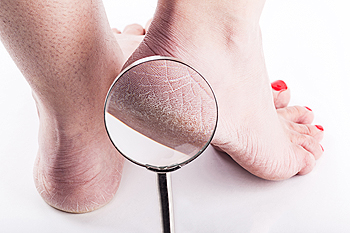 Cracked heels can affect anyone of any age, and they are caused by a lack of moisture. Thankfully, at-home remedies may be performed in order to rid yourself of this unsightly condition. Prior to treating your cracked heels, it is crucial that you are aware of what may be causing them. Cold weather, harsh soaps, standing for long hours, and improper footwear have all been linked as causes of cracked heels. A simple treatment you can try for cracked feet is to soak them in warm soapy water for twenty minutes at night. Afterwards, try using a pumice stone to scrape off any dead skin you may have. You should then rinse your feet, and carefully dry them with a towel. Lastly, moisturize them with a foot cream and wear a pair of socks overnight in order to trap in the moisture. If you have a more severe case of cracked heels, you should not hesitate to seek help from a podiatrist.
Cracked heels can affect anyone of any age, and they are caused by a lack of moisture. Thankfully, at-home remedies may be performed in order to rid yourself of this unsightly condition. Prior to treating your cracked heels, it is crucial that you are aware of what may be causing them. Cold weather, harsh soaps, standing for long hours, and improper footwear have all been linked as causes of cracked heels. A simple treatment you can try for cracked feet is to soak them in warm soapy water for twenty minutes at night. Afterwards, try using a pumice stone to scrape off any dead skin you may have. You should then rinse your feet, and carefully dry them with a towel. Lastly, moisturize them with a foot cream and wear a pair of socks overnight in order to trap in the moisture. If you have a more severe case of cracked heels, you should not hesitate to seek help from a podiatrist.
Cracked heels are unsightly and can cause further damage to your shoes and feet. If you have any concerns, contact one of our podiatrists from Active Foot and Ankle Care, LLC. Our doctors can provide the care you need to keep you pain-free and on your feet.
Cracked Heels
Cracked heels appear unappealing and can make it harder for you walk around in sandals. Aside from looking unpleasant, cracked heels can also tear stockings, socks, and wear out your shoes. There are several methods to help restore a cracked heel and prevent further damage.
How Do You Get Them?
Dry skin is the number one culprit in creating cracked heels. Many athletes, walkers, joggers, and even swimmers suffer from cracked heels. Age and skin oil production play a role to getting cracked heels as well.
Promote Healing
Over the counter medicines can help, especially for those that need instant relief or who suffer from chronic dry feet.
Wear Socks – Wearing socks with medicated creams helps lock in moisture.
Moisturizers – Applying both day and night will help alleviate dryness which causes cracking.
Pumice Stones – These exfoliate and remove dead skin, which allows for smoother moisturizer application and better absorption into the skin.
Change in Diet
Eating healthy with a well-balanced diet will give the skin a fresh and radiant look. Your body responds to the kinds of food you ingest. Omega-3 fatty acids and zinc supplements can also revitalize skin tissue.
Most importantly, seek professional help if unsure how to proceed in treating cracked heels. A podiatrist will help you with any questions or information needed.
If you have any questions, please feel free to contact our offices located in Fair Lawn, Riverdale, and Englewood, NJ . We offer the newest diagnostic and treatment technologies for all your foot care needs.
Read more about Solutions for Cracked Heels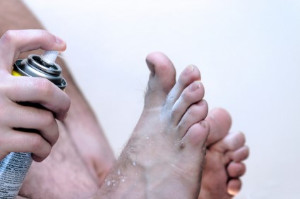 Athlete’s foot is a fungal infection that occurs between the toes. Symptoms of the condition are itchy, dry, red, scaly skin that tends to worsen in the summer when the weather is humid. The infection itself is usually contracted by walking around barefoot in public areas such as locker rooms or gym showers. Treatments for athlete’s foot come in creams, sprays, liquids, and powders, and they will help stop the fungus from growing. If you have athlete’s foot, be sure to wash your feet prior to applying the treatment to the skin and surrounding area. Also, do not apply to open wounds. Contact a podiatrist for tips on how to prevent and treat athlete's foot.
Athlete’s foot is a fungal infection that occurs between the toes. Symptoms of the condition are itchy, dry, red, scaly skin that tends to worsen in the summer when the weather is humid. The infection itself is usually contracted by walking around barefoot in public areas such as locker rooms or gym showers. Treatments for athlete’s foot come in creams, sprays, liquids, and powders, and they will help stop the fungus from growing. If you have athlete’s foot, be sure to wash your feet prior to applying the treatment to the skin and surrounding area. Also, do not apply to open wounds. Contact a podiatrist for tips on how to prevent and treat athlete's foot.
Athlete’s foot is an inconvenient condition that can be easily reduced with the proper treatment. If you have any concerns about your feet and ankles, contact one of our podiatrists from Active Foot and Ankle Care, LLC. Our doctors will treat your foot and ankle needs.
Athlete’s Foot: The Sole Story
Athlete's foot, also known as tinea pedis, can be an extremely contagious foot infection. It is commonly contracted in public changing areas and bathrooms, dormitory style living quarters, around locker rooms and public swimming pools, or anywhere your feet often come into contact with other people.
Solutions to Combat Athlete’s Foot
Athlete’s foot can cause many irritating symptoms such as dry and flaking skin, itching, and redness. Some more severe symptoms can include bleeding and cracked skin, intense itching and burning, and even pain when walking. In the worst cases, Athlete’s foot can cause blistering as well. Speak to your podiatrist for a better understanding of the different causes of Athlete’s foot, as well as help in determining which treatment options are best for you.
If you have any questions please feel free to contact our offices located in Fair Lawn, Riverdale, and Englewood, NJ . We offer the newest diagnostic and treatment technologies for all your foot and ankle needs.
 Morton’s neuroma occurs when there is a thickening of the tissue around the nerves leading to your toes. The pain associated with it is most commonly found between the third and fourth toes, but it can also be felt near the ball of the foot, or between the second and third toe. Causes of pain may be due to wearing shoes that are too tight such as high heels. Compared to others, people with bunions, hammertoes, and high foot arches may have a higher risk of developing Morton’s neuroma. If you suspect that you may have Morton’s neuroma it is important that you seek the assistance of a podiatrist right away in order to receive treatment.
Morton’s neuroma occurs when there is a thickening of the tissue around the nerves leading to your toes. The pain associated with it is most commonly found between the third and fourth toes, but it can also be felt near the ball of the foot, or between the second and third toe. Causes of pain may be due to wearing shoes that are too tight such as high heels. Compared to others, people with bunions, hammertoes, and high foot arches may have a higher risk of developing Morton’s neuroma. If you suspect that you may have Morton’s neuroma it is important that you seek the assistance of a podiatrist right away in order to receive treatment.
Morton’s neuroma is a very uncomfortable condition to live with. If you think you have Morton’s neuroma, contact one of our podiatrists of Active Foot and Ankle Care, LLC. Our doctors will attend to all of your foot care needs and answer any of your related questions.
Morton’s Neuroma
Morton's neuroma is a painful foot condition that commonly affects the areas between the second and third or third and fourth toe, although other areas of the foot are also susceptible. Morton’s neuroma is caused by an inflamed nerve in the foot that is being squeezed and aggravated by surrounding bones.
What Increases the Chances of Having Morton’s Neuroma?
Morton’s neuroma is a very treatable condition. Orthotics and shoe inserts can often be used to alleviate the pain on the forefront of the feet. In more severe cases, corticosteroids can also be prescribed. In order to figure out the best treatment for your neuroma, it’s recommended to seek the care of a podiatrist who can diagnose your condition and provide different treatment options.
If you have any questions, please feel free to contact our offices located in Fair Lawn, Riverdale, and Englewood, NJ . We offer the newest diagnostic and treatment technologies for all your foot care needs.
Read more about Morton's Neuroma Hyperhidrosis, or excessive sweating, occurs when the body produces more sweat than what is necessary in order to regulate body temperature. Approximately 7 million Americans suffer from the condition, and many who have it don’t realize they do; it is very common for this condition to go undiagnosed. People with the condition often want to avoid social situations, especially those that involve shaking hands. Hyperhidrosis can occur all over the body, or only in certain parts. The feet are a common area to experience the effects of hyperhidrosis due to the high concentration of sweat glands in them.
Hyperhidrosis, or excessive sweating, occurs when the body produces more sweat than what is necessary in order to regulate body temperature. Approximately 7 million Americans suffer from the condition, and many who have it don’t realize they do; it is very common for this condition to go undiagnosed. People with the condition often want to avoid social situations, especially those that involve shaking hands. Hyperhidrosis can occur all over the body, or only in certain parts. The feet are a common area to experience the effects of hyperhidrosis due to the high concentration of sweat glands in them.
If you are suffering from hyperhidrosis contact one of our podiatrists of Active Foot and Ankle Care, LLC. Our doctors can provide the care you need to attend to all of your foot and ankle needs.
Hyperhidrosis of the Feet
Hyperhidrosis is a rare disorder that can cause people to have excessive sweating of their feet. This can usually occur all on its own without rigorous activity involved. People who suffer from hyperhidrosis may also experience sweaty palms.
Although it is said that sweating is a healthy process meant to cool down the body temperature and to maintain a proper internal temperature, hyperhidrosis may prove to be a huge hindrance on a person’s everyday life.
Plantar hyperhidrosis is considered to be the main form of hyperhidrosis. Secondary hyperhidrosis can refer to sweating that occurs in areas other than the feet or hands and armpits. Often this may be a sign of it being related to another medical condition such as menopause, hyperthyroidism and even Parkinson’s disease.
In order to alleviate this condition, it is important to see your doctor so that they may prescribe the necessary medications so that you can begin to live a normal life again. If this is left untreated, it is said that it will persist throughout an individual’s life.
A last resort approach would be surgery, but it is best to speak with your doctor to find out what may be the best treatment for you.
If you have any questions please feel free to contact our offices located in Fair Lawn, Riverdale, and Englewood, NJ . We offer the newest diagnostic and treatment technologies for all your foot and ankle needs.
Read more about Hyperhidrosis of the Feet Running shoe companies are looking to 3D-printing to provide customers with the comfort and customization many runners require in running shoes. A new 3D-printing process, “selective laser sintering,” creates components of a shoe one layer at a time and allows companies to engineer the structure of a shoe, from outsole to midsole. Companies such as Nike, New Balance, and Adidas have used 3D-printing in recent releases. The new process will allow athletic companies to create one-of-a-kind models from the bottom up and to hone in quickly on custom fits for their clients and their running shoe needs.
Running shoe companies are looking to 3D-printing to provide customers with the comfort and customization many runners require in running shoes. A new 3D-printing process, “selective laser sintering,” creates components of a shoe one layer at a time and allows companies to engineer the structure of a shoe, from outsole to midsole. Companies such as Nike, New Balance, and Adidas have used 3D-printing in recent releases. The new process will allow athletic companies to create one-of-a-kind models from the bottom up and to hone in quickly on custom fits for their clients and their running shoe needs.
If you are a runner, wearing the right running shoe is essential. For more information, contact one of our podiatrists from Active Foot and Ankle Care, LLC. Our doctors can provide the care you need to keep you pain-free and on your feet.
Choosing the Right Running Shoe for Your Foot Type
To increase performance and avoid the risk of injury, it is important to choose the right running shoe based on your foot type. The general design of running shoes revolves around pronation, which is how the ankle rolls from outside to inside when the foot strikes the ground.
If you have any questions please feel free to contact our offices located in Fair Lawn, Riverdale, and Englewood, NJ . We offer the newest diagnostic and treatment technologies for all your foot and ankle needs.






